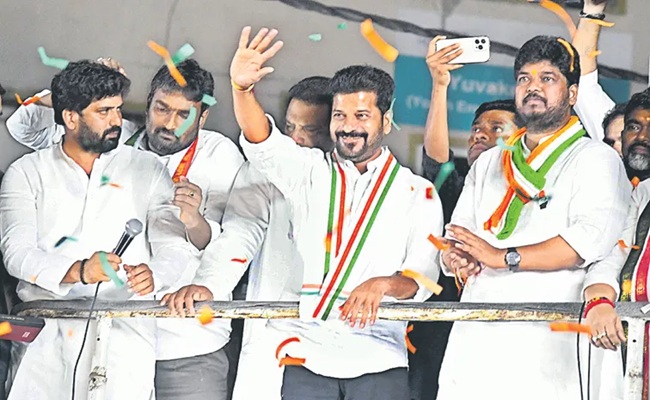The political landscape of Telangana is no stranger to spirited exchanges and sharp rhetoric, particularly as parties vie for public support and dominance. In a recent development that has captured significant attention, Telangana Chief Minister Revanth Reddy, a prominent leader of the Congress party, leveled a pointed accusation against two key figures from rival parties: K. T. Rama Rao (KTR) of the Bharat Rashtra Samithi (BRS) and G. Kishan Reddy of the Bharatiya Janata Party (BJP). Revanth Reddy controversially referred to KTR and Kishan Reddy as “bad brothers,” a statement that has reverberated through the state’s political corridors, sparking debate and speculation.
The Allegation: “Bad Brothers” and Public Scrutiny
Chief Minister Revanth Reddy’s striking commentary emerged during a public address, where he lambasted both KTR and Kishan Reddy, suggesting a shared failure to adequately serve the interests of Telangana. The context for this strong statement often revolves around issues of governance, development projects, and the allocation of central funds to the state. Reddy’s primary contention appears to be that despite their influential positions – KTR as a former powerful minister in the previous BRS government and Kishan Reddy as a Union Minister from Telangana – both have, in his view, fallen short in advocating for or delivering significant benefits to the state and its populace.
The “bad brothers” analogy, while provocative, serves to draw a parallel between the two leaders, implying a common thread of perceived inadequacy or even complicity, despite their outward political rivalry. Revanth Reddy’s rhetoric aims to position the Congress as the true champion of Telangana’s people, in contrast to what he portrays as the self-serving or ineffective leadership offered by the BRS and BJP.
Highlighting what he perceives as a dereliction of duty, Chief Minister Revanth Reddy was quoted asserting, “Despite having the opportunity to advance Telangana’s interests, both KTR and Kishan Reddy have acted like ‘bad brothers,’ failing to secure the state’s rightful share and prioritize its development over party politics. They were in positions to bring change but chose not to.” This statement encapsulates the core of his critique, suggesting a missed opportunity and a collective responsibility for the state’s challenges, regardless of their differing political affiliations.
Understanding the Telangana Political Chessboard
To fully grasp the weight of Revanth Reddy’s comments, one must understand the intricate political dynamics at play in Telangana. The state has been a hotbed of intense political competition, especially since its formation. The BRS (formerly TRS) held power for a decade under K. Chandrashekar Rao, with KTR playing a pivotal role. The Congress, led to victory by Revanth Reddy in the recent assembly elections, now seeks to consolidate its position and dismantle the legacies of its predecessors.
The BJP, under Kishan Reddy’s leadership in the state, has been making concerted efforts to establish a stronger foothold, positioning itself as a viable alternative to both the Congress and the BRS. In this multi-polar contest, political rhetoric often becomes a crucial tool to differentiate parties and influence public perception. Revanth Reddy’s strategy appears to be one of painting both his primary opponents with the same brush of inefficiency or opportunism, thereby attempting to neutralize their individual appeals and consolidate anti-incumbency sentiments against past regimes.
This political maneuvering is particularly significant given the upcoming Lok Sabha elections and future local body polls. By grouping KTR and Kishan Reddy together, Revanth Reddy might be attempting to prevent a fragmentation of the anti-BRS and anti-BJP vote, guiding it towards the Congress. It also serves as a strong signal to the electorate that his government is prepared to be aggressive in demanding justice and development for Telangana.
Rhetoric, Reality, and the Electorate
Such strong political statements, while providing fodder for media debates, also carry significant implications for the political discourse and public trust. The “bad brothers” label, while metaphoric, is designed to evoke a sense of betrayal and shared responsibility for perceived shortcomings. It challenges the individual narratives of KTR, who often highlights BRS’s developmental achievements, and Kishan Reddy, who emphasizes the BJP’s national vision and central government support.
The electorate in Telangana, known for its political awareness and active participation, will ultimately weigh these allegations against their own experiences and perceptions of the leaders and parties involved. While the immediate impact of such a statement might be heightened political temperature and counter-arguments from the BRS and BJP, its long-term effect will depend on how effectively Revanth Reddy’s government delivers on its promises and how convincingly the accused parties can defend their records. This episode underscores the intense, often personalized, nature of Indian politics, where powerful rhetoric plays a vital role in shaping public opinion and electoral outcomes.
As Telangana continues its journey under a new political guard, the interplay of accusations, defenses, and public judgment will remain central to its political narrative. Revanth Reddy’s “bad brothers” remark is not just a statement; it’s a strategic move in a high-stakes game for political supremacy in the heart of the Deccan.




